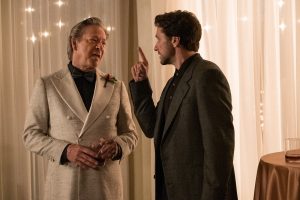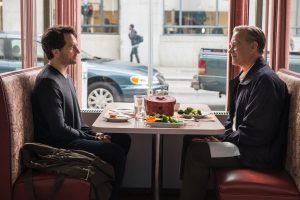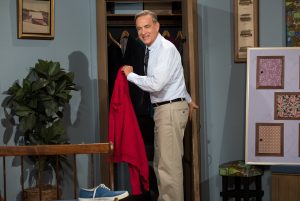“A Beautiful Day in the Neighborhood” (2019). Cast: Tom Hanks, Matthew Rhys, Chris Cooper, Susan Kelechi Watson, Maryann Plunkett, Enrico Colantoni, Wendy Makkena, Tammy Blanchard, Noah Harpster, Christine Lahti, Carmen Cusack, Kelley Davies, Maddie Corman, Daniel Krell, Jessica Hecht. Director: Marielle Heller. Screenplay: Micah Fitzerman-Blue and Noah Harpster. Story: Tom Junod, “Can You Say… Hero?”, Esquire magazine, 1998. Web site. Trailer.
Forgiveness is one of the most renewing and fulfilling acts we can undertake. However, it can also be one of the most difficult and challenging endeavors we can pursue, especially when a loved one, such as a family member, is involved. Nevertheless, the rewards that come from such a compassionate venture can be immeasurable. Such is the case with a new fact-based film that explores this subject from the standpoint of fathers and sons, “A Beautiful Day in the Neighborhood.”
Hard-nosed investigative journalist Lloyd Vogel (Matthew Rhys) may be good at his job, but he’s not the kind of person who others readily warm up to. That’s especially true for the subjects of his Esquire magazine articles, who often feel worked over in the wake of his probing investigations. However, the gritty Gothamite has become so jaded by his work that he seems on the verge of burnout, not a good state of mind for the father of a newborn. That’s why a change of scene is very much in order, an opportunity that comes when he’s invited to attend the wedding of his sister, Lorraine (Tammy Blanchard). There’s just one hitch, though: In the wake of the invitation, Lloyd’s wife, Andrea (Susan Kalechi Watson), informs him that his long-estranged father, Jerry (Chris Cooper), will be there. Lloyd claims he’s cool with that, but his outward attitude is clearly concealing his real feelings under layers of irrefutable emotional camouflage.
Once at the wedding, Lloyd does his best to avoid interacting with Jerry, but they eventually run into one another, a tense encounter that quickly escalates and results in a fist fight. Lloyd’s not proud of his behavior, but he has no regrets, either. Nevertheless, after that incident, he’s no better off emotionally or psychologically than he was before the wedding.
[caption id="attachment_11154" align="aligncenter" width="350"] Long-estranged father, Jerry (Chris Cooper, left), and son, Lloyd (Matthew Rhys, right), experience a tense moment at a family wedding in the new fact-based drama, “A Beautiful Day in the Neighborhood.” Photo by Lacey Terrell, courtesy © 2019 CTMG, Inc.[/caption]
Long-estranged father, Jerry (Chris Cooper, left), and son, Lloyd (Matthew Rhys, right), experience a tense moment at a family wedding in the new fact-based drama, “A Beautiful Day in the Neighborhood.” Photo by Lacey Terrell, courtesy © 2019 CTMG, Inc.[/caption]
Upon his return to work, Lloyd’s editor (Christine Lahti) tells him about the magazine’s upcoming edition, a special issue devoted to the subject of heroes. She then gives him his next assignment, a profile of children’s TV icon Fred Rogers (Tom Hanks). Lloyd is floored – and embarrassed – by the assignment, one far from typical of what he does. But Lloyd’s forced into taking it when his editor tells him that Mr. Rogers was the only one of the issue’s profile prospects who would agree to speak with him. And so, with his tail between his legs and a busted-up face, Lloyd travels to Pittsburgh to meet his subject – and a surprise destiny.
Skeptical that anyone can be as nice as Mr. Rogers appears to be, the cynical Mr. Vogel goes into his interview with a chip firmly planted on his shoulder. However, when conversing with the soft-spoken television host, Lloyd is intrigued by, but nevertheless somewhat uncomfortable with, his subject. That’s especially true when they switch roles and Mr. Rogers starts asking the questions, a skill the TV host was notably adept at. Lloyd’s family life proves to be a particularly sensitive topic for Fred’s questioning, so he gently, but persistently, probes his subject to get at the source of what is obviously some tremendous though long-buried, unresolved pain. In their sessions together, Lloyd invariably tries to withdraw, but he always keeps coming back, each time going deeper into his consciousness and coming to terms, albeit reluctantly, with the demons that haunt him. And, as time passes, remarkable developments occur. But who would have thought that a children’s television show host could work such wonders with a hard-edged reporter?
Through their conversations, Lloyd gets to see that Mr. Rogers is more than just a puppeteer who shares wise but simplistic observations with a juvenile audience. He comes to recognize that the gentle soul has much to offer in helping to bring people together, especially those who have been hurt and are much in need of healing. Lloyd gradually realizes that Fred Rogers, in his own quiet way, truly is a hero, one who treads lightly but courageously into troubled territory, surrounded by hostile parties, and carefully mends heavily damaged fences through loving compassion, practical sage advice, and warm, inviting smiles. The experience provides Lloyd with a fresh perspective, one that gives him a new outlook that carries over into myriad areas of his life. Indeed, who said Mr. Rogers was just for kids?
[caption id="attachment_11155" align="aligncenter" width="350"] Hard-nosed investigative journalist Lloyd Vogel (Matthew Rhys, right) meets his unlikely interview subject, children’s TV icon Fred Rogers (Tom Hanks, left), in director Marielle Heller’s “A Beautiful Day in the Neighborhood.” Photo by Lacey Terrell, courtesy © 2019 CTMG, Inc.[/caption]
Hard-nosed investigative journalist Lloyd Vogel (Matthew Rhys, right) meets his unlikely interview subject, children’s TV icon Fred Rogers (Tom Hanks, left), in director Marielle Heller’s “A Beautiful Day in the Neighborhood.” Photo by Lacey Terrell, courtesy © 2019 CTMG, Inc.[/caption]
Individuals living with circumstances like Lloyd’s often feel stuck. They see things as unchangeable, largely because those conditions arose out of events that themselves can’t be changed. Consequently, they become dug in, convinced that they’ll have to live with those arrangements for the rest of their lives.
But do they?
Based on the events depicted here, Lloyd’s circumstances are what they are because he believes them to be that way, and, given the strength and tenacity of those beliefs, they’ve anchored him into a mindset that seems unalterable. That’s not surprising, though, given that’s how the conscious creation process works, the philosophy that maintains our thoughts, beliefs and intents manifest the reality we experience. And, the more power we give to them, the more persistent they become, perhaps even stubbornly so. In light of that, then, is it any wonder that such conditions become pervasive and locked in?
But need that be the case forever? As conscious creators know, we choose the beliefs we hold, which inherently means that they’re capable of change – provided we allow that to happen. In Lloyd’s case, unfortunately, he’s become so ingrained in his thinking that he can’t see his way out of it. He’s holding on to the past hurts of his father abandoning his family and leaving them to fend for themselves during the hard times that followed, a particularly difficult period when Lloyd’s mother, Lila (Jessica Hecht), became ill and died. He’s unable to forgive Jerry, which is certainly understandable, but, in the end, who is Lloyd really hurting by so firmly and unrelentingly grasping that view?
[caption id="attachment_11156" align="aligncenter" width="350"] Loving father Lloyd Vogel (Matthew Rhys, left) seeks to build a healthy, happy life with his wife, Andrea (Susan Kalechi Watson, right), and young son in “A Beautiful Day in the Neighborhood.” Photo by Lacey Terrell, courtesy © 2019 CTMG, Inc.[/caption]
Loving father Lloyd Vogel (Matthew Rhys, left) seeks to build a healthy, happy life with his wife, Andrea (Susan Kalechi Watson, right), and young son in “A Beautiful Day in the Neighborhood.” Photo by Lacey Terrell, courtesy © 2019 CTMG, Inc.[/caption]
The irony in Lloyd’s outlook is that he’s alone in his family when it comes to that perspective. By virtue of the fact that his sister Lorraine invited their father to the wedding, she’s obviously changed her view and let go of the pain. Similarly, Jerry has made a concerted effort to get over the mistakes of his past, forgiving himself for his actions and seeking the same from his kids in an effort to reconnect with them, extending an olive branch that couldn’t have been easy to share. But Lloyd is dug in, unable – or unwilling – to change his stance. That is, until he meets Mr. Rogers.
Through a series of sensitive, kind, calm conversations, as well as various compassion-based exercises, Fred works with Lloyd to break down the previously intractable barriers, to help him reconsider and rewrite his beliefs. Mr. Rogers can clearly see that Lloyd wants to alleviate himself of the pain he’s been carrying around for so many years; he simply helps Lloyd see how to do it and what to replace those outmoded beliefs with. It’s a valuable tool for not only helping Lloyd change his relationship with his father, but also to alter his view of the world at large, making it possible for him to adopt a fresh perspective to see how his overall reality operates. Charting a new course for oneself can be life-changing when we’re stuck in a longstanding rut, and Lloyd at last has an opportunity to see how to make that happen.
At the core of this, obviously, is the matter of forgiveness. As many alternate thought practitioners maintain, forgiveness is an act that often benefits the individual who extends it as much as, if not more than, the person to whom it is extended. Holding on to the beliefs that prevent reconciliation from happening becomes an increasingly great burden over time, one that requires tremendous energy to maintain – energy that could certainly be put to far more productive purposes than holding a grudge. The catharsis that comes from forgiving thus eliminates the burden and frees up energy that has been locked away in a long-simmering and ultimately fruitless pursuit.
[caption id="attachment_11157" align="aligncenter" width="350"] Hard-nosed investigative journalist Lloyd Vogel (Matthew Rhys, left) learns how to invoke a moment of stillness – a practice that can be successfully implemented any time and anywhere, even a busy Chinese restaurant – to go within and become introspective, an exercise taught him by children’s television icon Fred Rogers (Tom Hanks, right) in “A Beautiful Day in the Neighborhood.” Photo by Lacey Terrell, courtesy © 2019 CTMG, Inc.[/caption]
Hard-nosed investigative journalist Lloyd Vogel (Matthew Rhys, left) learns how to invoke a moment of stillness – a practice that can be successfully implemented any time and anywhere, even a busy Chinese restaurant – to go within and become introspective, an exercise taught him by children’s television icon Fred Rogers (Tom Hanks, right) in “A Beautiful Day in the Neighborhood.” Photo by Lacey Terrell, courtesy © 2019 CTMG, Inc.[/caption]
Such is the stuff of redemption, which, in many ways, is little more than embracing a new choice for oneself. Granted, the scale and magnitude of the choice may be much greater than what’s involved in something as mundane as deciding what to have for dinner, but it nevertheless comes down to a central question of choice, one that opens new doors for the chooser and those whom this decision affects. There’s a lot to be said for a fresh start, and redemption makes that possible.
Forgiveness and redemption also provide us with much else to consider, particularly when it comes to evaluating why we went through what we did. For example, in Lloyd’s case, his difficulties growing up arguably did much to toughen him up and give him a thick skin – qualities that come in quite handy for someone aspiring to be an investigative journalist. And, given Lloyd’s success in his career, those attributes served him well in his work. Would such an outcome have occurred had it not been for the personal experiences he underwent during his upbringing? That probably can’t be answered definitively, but many professional success stories often cite their own life experiences as significant influences in how and why they achieved the results that they have.
Reflecting on such matters provides us with a new perspective on why we may have held on to some of the seemingly “unproductive” beliefs of our past. Such introspection helps to show us how we became who we have become. And, if our successes have arisen from such beliefs and resulting experiences, despite (or perhaps because of) the hardships, then there’s something to be thankful in that, perhaps even some gratitude that might not have been readily apparent at first glance.
While Lloyd did most of the heavy lifting in changing his life, Fred Rogers is certainly due his share of the credit for helping him turn things around. It’s impressive that he was able to work such wonders by simply engaging in thoughtful conversation, but words and ideas have tremendous power, tools readily capable of changing beliefs (and we can all see what that’s capable of). This came easily and naturally to Fred, and he was tremendously successful at it, but, then, that’s because he was engaging in his value fulfillment, the conscious creation concept associated with being our best and truest selves for the betterment of ourselves and those around us.
[caption id="attachment_11158" align="aligncenter" width="350"] Children’s TV icon Fred Rogers (Tom Hanks) works his magic on an unlikely subject in the new fact-based drama, “A Beautiful Day in the Neighborhood.” Photo by Lacey Terrell, courtesy © 2019 CTMG, Inc.[/caption]
Children’s TV icon Fred Rogers (Tom Hanks) works his magic on an unlikely subject in the new fact-based drama, “A Beautiful Day in the Neighborhood.” Photo by Lacey Terrell, courtesy © 2019 CTMG, Inc.[/caption]
Fred’s plainspoken but heartfelt wisdom left quite a legacy, one that we need in these troubled, noisy and polarized times. Through this film and the excellent documentary “Won’t You Be My Neighbor?” (2018), viewers are provided with an in-depth look at the TV icon’s insights, giving us an opportunity to see just how valuable they are for living, especially coping with the unsettling social climate we face today. It’s interesting to note how Mr. Rogers is relegated to a supporting role here, but that serves to illustrate the true power in what he espouses, that these “background” ideas, when brought to the surface, can have abundant impact in transforming the nature of the greater reality of which they’re a part. Such notions have the capability to truly manifest a beautiful day in “the neighborhood” at large.
Director Marielle Heller’s heart-tugging tale of redemption and forgiveness is the sort of soothing tale we could use more of these days. Hanks delivers an outstanding, exceedingly reverent portrayal of the legendary and unlikely television star, as does Cooper as the long-absent and now-penitent father figure. This heartwarming yarn’s innate predictability is creatively offset by a variety of inventive cinematic techniques and clever storytelling tactics, particularly in its whimsical production design, which lovingly mimics the low-tech sets of Rogers’ television show. Admittedly, the picture could have used a stronger male lead than Rhys, and the back story of the protagonist’s conflict with his father could have been fleshed out a little more, but the film otherwise comes through with a comfortable, calming likability that quietly but effectively makes its point without browbeating the audience.
As one watches “Beautiful Day,” one would swear that Hanks is channeling the spirit of Mr. Rogers. His effort has paid off, too, earning him best supporting actor nominations in the Golden Globe, Critics Choice and Screen Actors Guild Award programs. In addition, this fictionalized retelling of journalist Tom Junod’s experience and relationship with his soft-spoken but famous friend also captured a Critics Choice Award nomination for best adapted screenplay.
In this holiday season, when the spirit of goodwill tends to be on everyone’s mind perhaps a little more than at other times of the year, it helps to have films like this to remind us of the power of forgiveness. It may seem a little strange that someone as unlikely as Mr. Rogers can so pointedly show us the rewards that come from invoking it in our lives. But, if doing so can help to bring peace of mind to the weary among us, there’s certainly something remarkable to be said for that.
Copyright © 2019, by Brent Marchant. All rights reserved.
Tuesday, December 17, 2019
‘Beautiful Day’ extols the virtues of forgiveness
Subscribe to:
Post Comments (Atom)

No comments:
Post a Comment